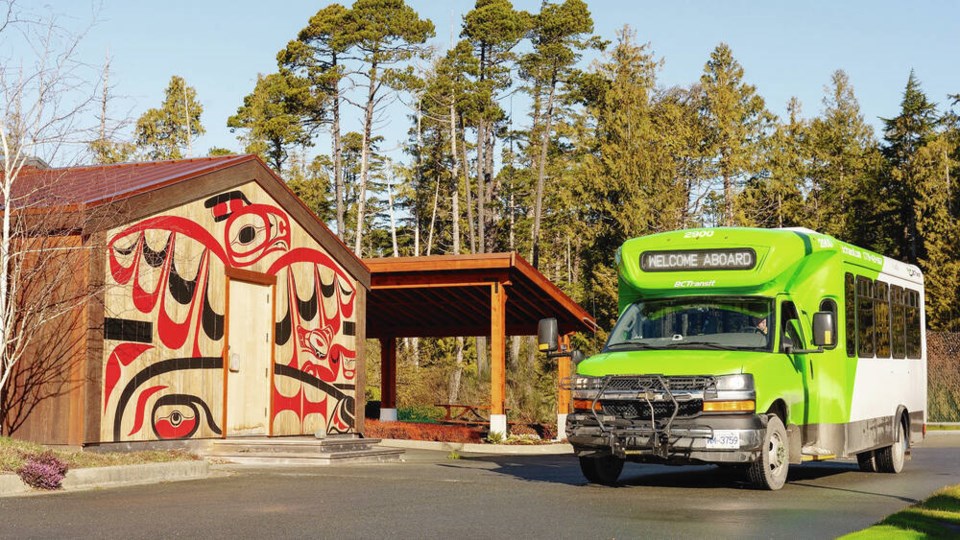New 18-seat buses featuring B.C. Transit’s new green livery, now parked at a bus depot in Port Alberni, are set to take over a homegrown bus system serving Tofino, Ucluelet and nearby First Nation communities on March 1.
B.C. Transit spokesperson Jaime Weiss said the new service has more stops and longer service hours, and will offer slightly cheaper single-fare rides than the Alberni-Clayoquot Regional District’s West Coast Transit System, which began operations last April.
Weiss said West Coast Transit System was always meant to be temporary.
B.C. Transit had been in talks with Alberni-Clayoquot Regional District and the provincial government for more than a decade before the regional district struck out on its own last year to kickstart the process without provincial funding, Weiss said.
Now, B.C. Transit is prepared to take over operations after the province allocated enough funding for transit expansion in the 2024-25 budget. It’s the transit agency’s first major system expansion in eight years.
“We’re getting it in just under the wire, just before the end of fiscal [year],” Weiss said.
The West Coast Transit System was established with funding from Tofino, Ucluelet, Toquaht Nation and Ucluelet First Nation with three 18-seater buses that were brought to the west coast from northern Alberta.
The transit system provided seven round trips between Tofino and Ucluelet on weekdays at $5.50 per trip, with reduced service frequency on weekends.
Under B.C. Transit, a single adult fare will be $5 and a day pass will be $10, while a 30-day pass will cost $100. Seniors can ride for $2, while students attending Ucluelet Secondary and Wickaninnish Community School and children aged 12 and under will ride for free.
The operating costs of the old system were estimated to be $670,000 per year. B.C. Transit’s system will cost $1.2 million to run a year, with the Alberni-Clayoquot Regional District responsible for 53.31 per cent of those operating costs — about $640,000.
The rest is funded by the province through B.C. Transit, which had an operating budget of $162.6 million in the 2024-25 budget.
Regional district operations manager Eddie Kunderman said he’s happy to have B.C. Transit on board, as now “the experts are in place doing the stuff they do best.”
While the community was initially excited to welcome a public transit system, there were growing pains with the district-operated system that led to lowered service levels at times, he said.
“Workforce was a challenge,” he said. “We were able to kind of address those as we went, but it was definitely the big challenge.”
B.C. Transit’s real-time bus tracker will show riders when a bus will arrive, he said. “That GPS-specific ridership ability to track your trip, to see and track it through the transit app … it makes a big difference to the overall experience,” he said.
Drivers reported about 8,000 riders from April to December last year on the West Coast Transit System, Kunderman said.
Weiss said a Tofino-Ucluelet transit system was the biggest request B.C. Transit heard from its partners on Vancouver Island in recent years, other than inter-regional routes.
The three buses currently operating in the region — one of which still has the white-red-blue livery of the Fort Saskatchewan, Alta. transit system — will be replaced by the five new 2024 Chevrolet ARBOC buses currently in Port Alberni when B.C. Transit takes over.
Pacific Western Transportation, which operated the original West Coast Transit System, will continue to be the operating contractor.
With B.C. Transit, the cashless payment system will switch from the San Francisco-developed Token Transit mobile to B.C. Transit’s Umo app — a payment system owned and operated by Cubic Corporation, a California-based transportation and defence company.
Kunderman said the community was split as to whether they preferred using a mobile app or the 10-pass paper tickets that were available for purchase at the Tofino and Ucluelet Co-Op stores for $50.
B.C. Transit’s single-route system will run nine roundtrips from 7 a.m. to 11 p.m., servicing 36 stops in the communities of Tofino, Ucluelet, hitaću, Esowista and Ty-histanis as well as Long Beach. On weekends, there will be eight roundtrips between 7 a.m. and 9 p.m.
B.C. Transit said the system will be the first ever to include signage in Nuu-chah-nulth at bus stops.
It's one of two local public transit systems west of Kennedy Lake.
Tofino has a shuttle service funded by tourism dollars and pay-parking revenue, but that only runs seasonally and routes don’t go far beyond municipal borders.
>>> To comment on this article, write a letter to the editor: [email protected]




